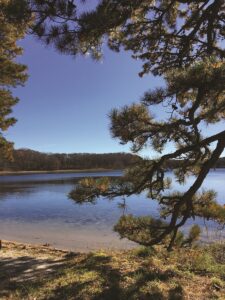I’m sure I have forgotten more about fishing than I now know. Every time I go, I find myself remembering, usually too late, that I should be using a different lure or should have arrived on a different tide or time of day. I’m also reminded, practically every time I grab my rod, how much I still have to learn.
A few weeks ago, when I got to one of my favorite fishing holes on the east side of Gull Pond in Wellfleet, I saw a truck occupying one of the two parking spaces there. As the other fisherman came up the path, I asked him how the fishing had been, and he replied he had caught a couple of nice holdover trout — fish that had lived in the pond and grown bigger than recently stocked trout.
“This is what I caught my big fish on,” he said, pointing out a tiny little fly at the end of his line, a bead-head nymph that I had seen used only on trout streams.
“I’ve got a pile of those at home,” I said. “Maybe I should go get one.”
“No need for that,” the fisherman said, opening up a little fly box and handing me one. I thanked him and introduced myself.

“Are you the same Jim Gilbert who used to write for the Advocate back in the day?” he asked. “I’m Lowell. We used to fish together here.” Sure enough. We laughed, shook hands, and launched into a few memories. The tiny nymph worked like a charm. With every trout I caught that day, and all I’ve caught since, I offer Lowell a silent thank you.
I was casting for low-tide stripers on Lieutenant Island in Wellfleet a half-dozen years ago when I first ran into Tony, who introduced me to the wonders of small soft-tail jigs. I had watched as he hooked a fish on virtually every cast. Finally, I waded up to him: “Can I ask what lure you’re using?”
He smiled and lifted his jig out of the water, a lure identical to the one I was using, only a third the size. “This is all you need,” he said, suggesting I retire my bigger jigs when beach fishing. As I started to walk back to my previous station, he reached into his pocket. “Use these today,” he said, dropping a pair of jig heads and a few soft-tails into my palm. Tony, as passionate and open-hearted a striper fisherman as I have ever met, was right. I started catching fish on my very next cast.
Virtually everything I know about fishing comes from two sources: experience and advice. Of the two, advice is the more important, because learning from others opens the way to actual experience.
I caught the fishing bug when I was seven, hooking yellow perch with my grandfather in northern Vermont. But I learned the importance of attention to detail — the right hook, the right knots, the right way to bait a hook — from Victor Alexander of Provincetown, the best fisherman (and bartender) I ever met.
It’s easy to make new friends beach fishing here. Part of the reason is a lack of territoriality. The shore is vast on Cape Cod. Here, you never get the feeling of possessiveness you might experience, say, when another fisherman beats you to your favorite trout pool on a river.
On the beach, when the fish are in, there’s plenty for everyone. If they’re not, everyone’s in a fine place to commiserate with strangers and swap tales and intelligence. Beach fishing, like surfing, begs a little friendly exaggeration: “Aye, mate, you should have been here yesterday!”
It always surprises me when I catch a fisherman’s furtive glance, a look that says, “I’m not sure I know what I’m doing, but I wish I could ask.” The vast majority of beach fishermen here are happy to stop fishing for a bit to offer some advice.
In fly fishing, you might learn the most and catch the most fish when you hire an expensive guide. The same could be true on a charter boat. But if you want to fish on the beach, put your pride aside and take a look around. You’ll see plenty of “guides” who won’t charge a penny for their advice.



